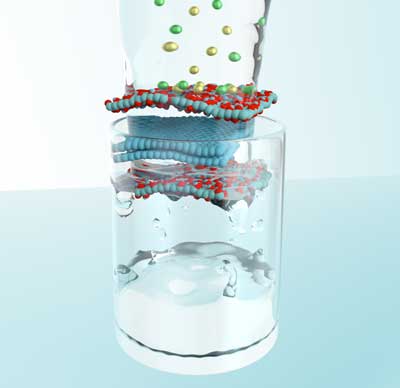| Posted: Aug 30, 2017 |
Toward a smart graphene membrane to desalinate water
(Nanowerk News) An international team of researchers, including scientists from Shinshu University (Japan) and the director of Penn State’s ATOMIC Center, has developed a graphene-based coating for desalination membranes that is more robust and scalable than current nanofiltration membrane technologies (Nature Nanotechnology, "Effective NaCl and dye rejection of hybrid graphene oxide/graphene layered membranes").
|
|
The result could be a sturdy and practical membrane for clean water solutions as well as protein separation, wastewater treatment and pharmaceutical and food industry applications.
|
 |
| A scalable graphene-based membrane for producing clean water. (Image: Aaron Morelos-Gomez)
|
|
“Our dream is to create a smart membrane that combines high flow rates, high efficiency, long lifetime, self-healing and eliminates bio and inorganic fouling in order to provide clean water solutions for the many parts of the world where clean water is scarce,” says Mauricio Terrones, professor of physics, chemistry and materials science and engineering, Penn State. “This work is taking us in that direction.”
|
|
The hybrid membrane the team developed uses a simple spray-on technology to coat a mixture of graphene oxide and few-layered graphene in solution onto a backbone support membrane of polysulfone modified with polyvinyl alcohol. The support membrane increased the robustness of the hybrid membrane, which was able to stand up to intense cross-flow, high pressure and chlorine exposure.
|
|
Even in early stages of development, the membrane rejects 85 percent of salt, adequate for agricultural purposes though not for drinking, and 96 percent of dye molecules. Highly polluting dyes from textile manufacturing is commonly discharged into rivers in some areas of the world.
|
|
Chlorine is generally used to mitigate biofouling in membranes, but chlorine rapidly degrades the performance of current polymer membranes. The addition of few-layer graphene makes the new membrane highly resistant to chlorine.
|
|
Graphene is known to have high mechanical strength, and porous graphene is predicted to have 100 percent salt rejection, making it a potentially ideal material for desalination membranes. However, there are many challenges with scaling up graphene to industrial quantities including controlling defects and the need for complex transfer techniques required to handle the two-dimensional material.
|
|
The current work attempts to overcome the scalability issues and provide an inexpensive, high quality membrane at manufacturing scale.
|

